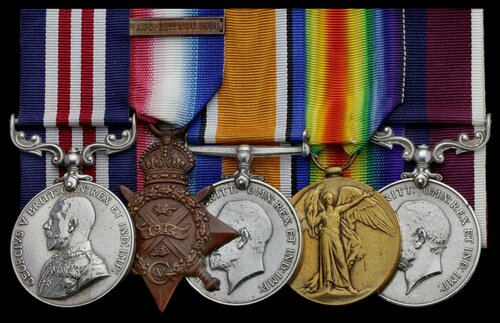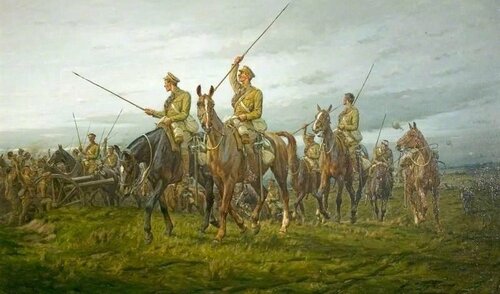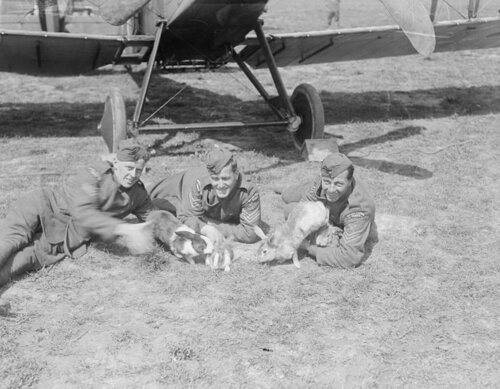Auction: 21001 - Orders, Decorations and Medals (conducted behind closed doors)
Lot: 422
(x) A rare Great War M.M. group of five awarded to Sergeant W. Windebank, Royal Air Force, late 12th Lancers and Royal Flying Corps
Military Medal, G.V.R. (104631 Cpl. Mech: W. Windebank. R.A.F.); 1914 Star, with clasp (5933 Pte. W. Windibank, 12/Lrs.), note spelling of surname; British War and Victory Medals (104631 Cpl. W. Windebank, R.A.F.); Royal Air Force L.S. & G.C., G.V.R., coinage bust (104631 Sgt. W. Windebank, R.A.F.), contact marks and a little polished, nearly very fine (5)
Just 92 Military Medals were awarded to members of the Royal Air Force in the Great War.
M.M. London Gazette 8 November 1918.
William Windebank, a native of Guildford, was born in Hampshire in September 1886 and enlisted in the 12th Lancers in December 1905. Mobilised with his Regiment on the outbreak of hostilities, he was embarked for France, and no doubt shared in his regiment’s “hour of glory” at Cerizy on 28 August 1914 and subsequently in the action at Wytschaete on the last day of October. An account of the former action adds some colour to what Windebank would have played a part in:
'On 28 August the Corps was continuing its march towards La Fere and the cavalry found itself near Cerizy. At this point the pursuing German horsemen came into touch with it. At about five in the afternoon three Squadrons of the enemy advanced upon one squadron of the Scots Greys, which had the support of ‘J’ Battery. Being fired at, the Germans dismounted and attempted to advance upon foot, but the fire was so heavy that they could make no progress and their led horses stampeded. They retired, still on foot, followed up by a Squadron of the 12th Lancers on their flank. The remainder of the 12th Lancers, supported by the Greys, rode into the dismounted dragoons with sword and lance, killing or wounding nearly all of them. A section of guns had fired over the heads of the British Cavalry during the advance into a supporting body of German Cavalry, who retired, leaving many dead behind them. The whole hostile force retreated northwards, while the British Cavalry continued to conform to the movements of the First Corps. In this spirited little action, the German Regiment engaged was, by the irony of fate, the 1st Guard Dragoons, Queen Victoria’s Own. The British lost 43 killed and wounded. Among the wounded were Major Swetenham and Captain Mitchell of the 12th Lancers. Colonel Wormald of the same regiment was wounded. The excited troopers rode back triumphantly between the guns of ‘J’ Battery, the cavalrymen exchanging cheers with the horse-gunners as they passed, and brandishing their blood stained weapons.'
Returning to an appointment at Aldershot in April 1915, he was tried by District Court Martial in June 1916 and awarded 56 days in detention, though 42 of them were remitted on account of his time under arrest awaiting trial.
Windebank was subsequently the subject of a compulsory transfer to the Royal Flying Corps in September 1917, in which capacity he joined the strength of No. 59 Squadron in March 1918, an Army co-operation unit engaged on reconnaissance and bombing duties. As verified by Windebank’s service record, he was re-mustered as a Corporal Wireless Operator in the same year (AMWO 1483/18 refers), so his subsequent award of the M.M. was almost certainly in respect of gallant deeds under fire while liaising with the Royal Artillery and his own squadron. Post-war, he was advanced to Sergeant in July 1922, awarded his L.S. & G.C. Medal in June 1926, and discharged in December 1929, his place of residence then being in Margate, Kent.
Subject to 5% tax on Hammer Price in addition to 20% VAT on Buyer’s Premium. For more information please view Terms and Conditions for Buyers.
Sold for
£1,700
Starting price
£1100









